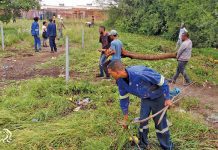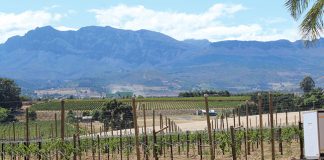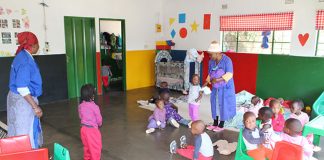To most people Gauteng would not bring to mind the image of lush crop fields or technologically advanced agriculture. Yet the Gauteng Department of Agriculture, Conservation and Environment (GDACE) has a range of projects that aim to promote economic growth and job creation, fight poverty and build strong, sustainable communities through agriculture. Gwenda van Zyl finds out more about these initiatives.
Nature has endowed our province with natural resources. The economic, social and political evolution of our province has been such that it is now a largely urban area,” says Gauteng MEC for agriculture, conservation and environment Khabisi Mosunkutu.
“Therefore, the joke that agriculture in Gauteng is a myth, by some is considered true.” Serious agricultural potential Gauteng has 438 623ha of potentially arable land but only 293 571ha is utilised. There is clearly much potential for agriculture.
“However, the fact that Gauteng is an economic hub means we have stiff competition for land use. Industrial and residential land use competes with the need to utilise the land for agriculture,”
Mosunkutu says. In an effort to expand Gauteng’s agriculture so as to contribute to job creation, poverty alleviation and sustainable production, the Gauteng Department of Agriculture, Conservation and Environment (GDACE) has embarked on a number of projects. “Our strategy focuses on the entire agricultural value chain, including commercial and emerging farmers, as well as on first and second agricultural economies,” he says.
The first of the three directorates responsible for agriculture include Farmer Support and Development, which handles farmer settlement and support, food security and poverty alleviation. second directorate is Economics and Marketing, which concentrates on agribusiness development and support, macroeconomics and marketing. third directorate is Technology Development and Support, which deals with resource planning and development, production support and development, and agricultural information systems.
The GDACE’s projects in each directorate include:
Farmer Support and Development Community food gardens: Every year 32 projects are established in the poorest areas of the province, targeting women, youth, the disabled and people infected and affected by HIV/Aids.
From April 2006 to February 2007, 35 projects were established. Community groups receive grants of R4 000 per beneficiary over three years. beneficiaries also receive training and support during this period.
Homestead food gardens: Targeting the poorest of the poor, the GDACE assists 9000 homestead food gardens per year. Beneficiaries are given inputs and gardening tools to help them to produce food in their gardens.
Comprehensive Agricultural Support Programme: Financed by the National of it offers grants to a maximum of R150 000 per farmer or farm for infrastructure development.
The programme aims to assist emerging farmers to farm profitably and quickly move into commercial farming. Extension and training services: This service is run through field extension officers. Farmers receive individual or group services depending on their circumstances and needs. Extension programmes are drawn up according to a needs assessment for every farmer.
Support to land reform and agrarian projects: GDACE offers pre- and post-settlement support to land reform projects. Pre-settlement support includes the development of business plans, and post-settlement support includes services such as development of production plans.
Female Farmer of the Year Competition: This competition is run annually to showcase the best performing women in agriculture and to recognise their contribution to the sector. The competition recognises female farmers in four categories: export market, national market, informal market and best household production.
Economics and Marketing Agro-processing: The Agricultural Research Countil (ARC) is developing an agro-processing strategy for Gauteng. This has been identified by the Gauteng Growth and Development Strategy as a business area that has potential for exploitation. The aim of the strategy is to realise a united and prosperous agricultural sector to increase economic growth and income generation, significantly contribute to the reduction of unemployment and eradication of poverty. Planning is also under way for the implementation of agro-processing infrastructure projects.
Mafisa: Micro-Agricultural Finance Institutions of South Africa (Mafisa) is a scheme that addresses financial services needs of the micro and small-scale agricultural sector. It provides capital (loans) to enhance agricultural activities and promotes a culture of saving amongst emerging agribusinesses. Farmers can access a R100 000 loan for input costs at an interest rate of 8%. The fund is administered through the Land Bank.
AgriBEE: The department’s AgriBEE framework aims to improve equitable access to and participation in agricultural opportunities, deracialise land and unlock the entrepreneurial potential in the sector. The department encourages partnerships between established agricultural enterprises and emerging farmers, particularly to facilitate international and domestic market access for Gauteng’s agricultural products. Several regional and local municipality workshops aim to promote awareness and understanding of the reliance of AgriBEE on local municipality delivery levels and how it contributes to an inclusive agricultural sector. Terms of reference to appoint a service provider to develop an AgriBEE strategy for the province are being concluded.
Women in Agriculture and Rural Development (Ward): This programme promotes and advocates the full participation of women in all agricultural activities within the province. Business plan development: This project assists farmers to develop business plans for their enterprises. Training and agribusiness development: Farmers are trained in business skills.
Market development support: Market development studies, market information distribution and risk mitigation are some of the services provided by this project.
Economic statistics databases: This project maintains multi-sectoral databases. Project Provide, which is a policy decision support tool, will be accommodated under this programme.
Production economics: Examines individual enterprise models. The Combud (computer-based enterprise budgeting) tool is used for this programme.
Technology Development and Support Gauteng Agricultural Potential Atlas (version 3): This is a decision support tool that identifies the location of agricultural land. Already seven agricultural hubs or corridors with moderate to high potential agricultural land have been identified. With government supporting these hubs outside the urban edge, they will be reserved for agriculture to develop into highly productive farming units. Emerging farmers will be advised to focus on these areas when they purchase land.
Agriculture Decision Support System: A database for the collection and storage of relevant agricultural data is being developed. It will serve as a decision support tool for the department. Information for various purposes will also be packaged from this database. An important function will be to supply relevant, timely and appropriately packaged information to clients according to their needs. One of the major goals is to enable the GDACE to supply quality information for strategic decision-making, especially to commercial farmers.
Research agenda: A project for researching various topics outsourced to research institutions has been developed. Six research projects are currently being carried out by the ARC:
1. Creating a technology development and transfer incubator and agribusiness through cooperative or consortium forming, and training emerging farmers in Gauteng on hydroponic vegetable production methods to help them produce and market high value crops.
2. Producing medicinal plants through the technology incubator.
3. Creating feeding systems for developing poultry and pig farmers that to improve productivity by overcoming constraints such as diseases and high feed costs.
4. Evaluating and transferring affordable nutritional management techniques and alternative feed resources for emerging livestock farmers in Gauteng.
5. Processing agro-industry by-products as alternative feed sources for emerging livestock farmers in Gauteng.
6. Supplying diagnostic laboratory equipment. Biotechnology: Work has been outsourced to Africa-Bio to facilitate the development of a biotechnology strategy for Gauteng. This project should be concluded by the end of this financial year (2007/08).
Monitoring and evaluating community food production projects: Wits Enterprise has been appointed for this project and is scheduled for completion in May 2007. For more information on these projects contact the Gauteng Department of Agriculture, Conservation and Environment on (011) 355 1316, fax (011) 333 0620 or visit www.gdace.gpg.gov.za. |fw













